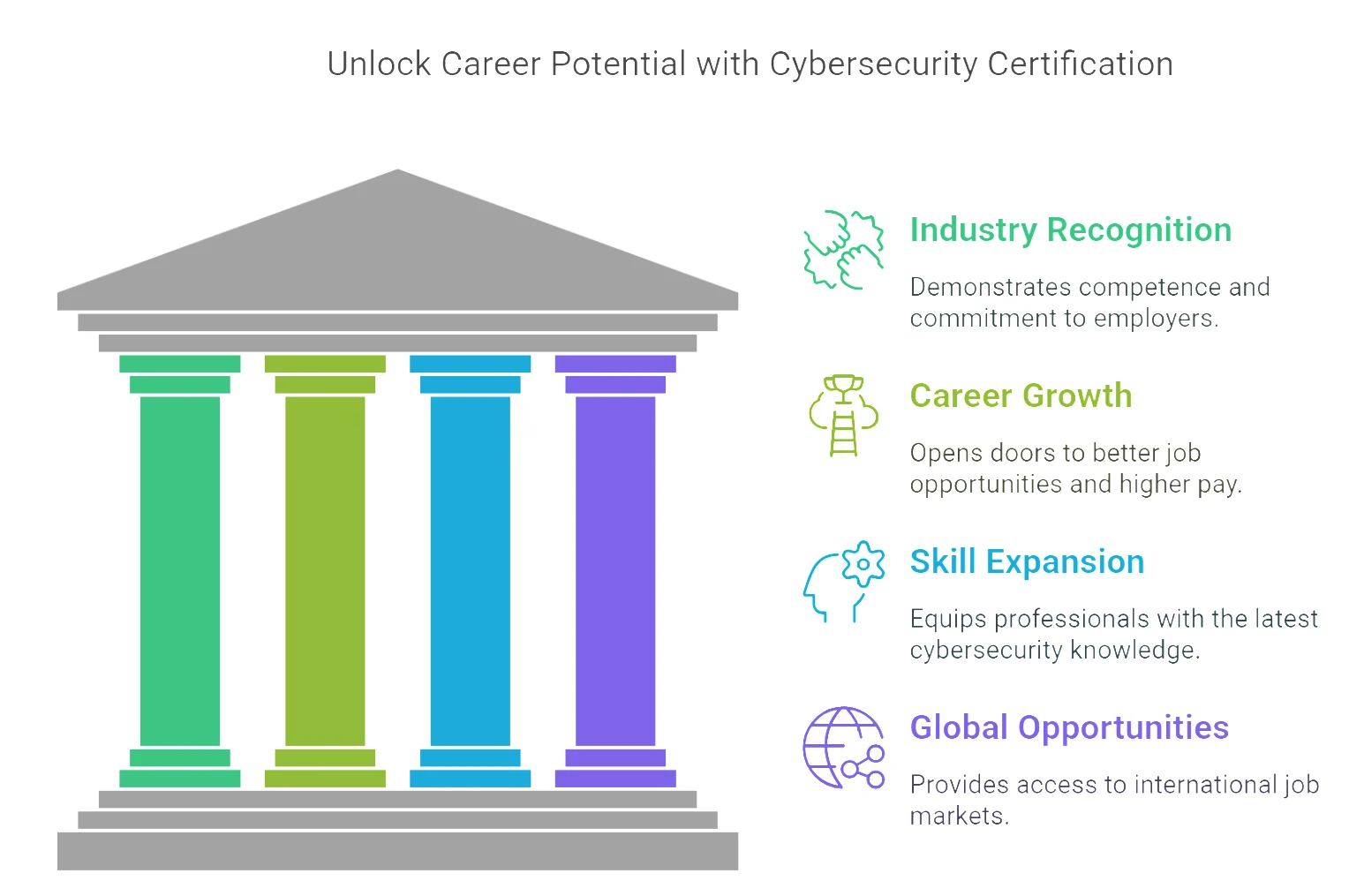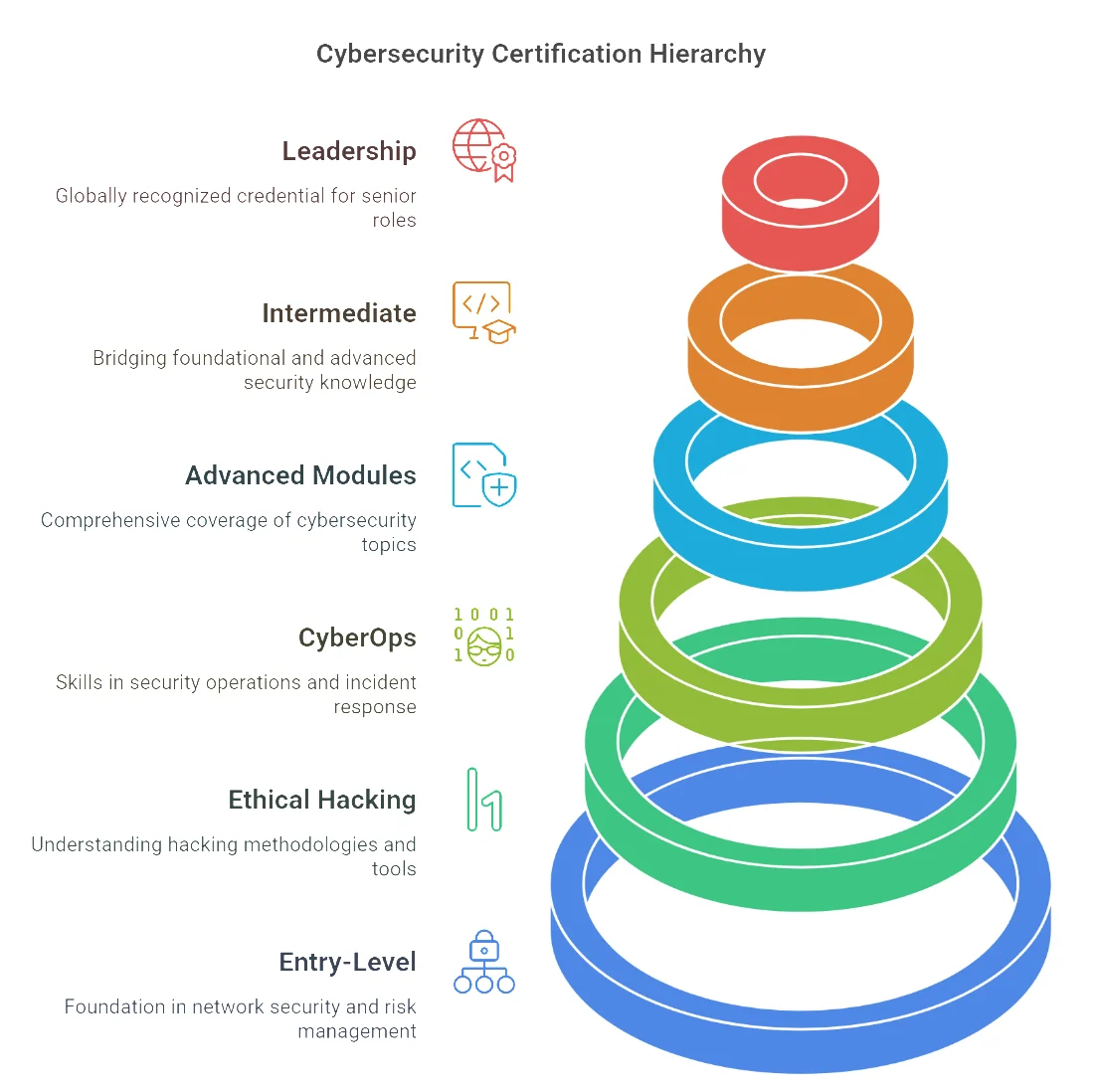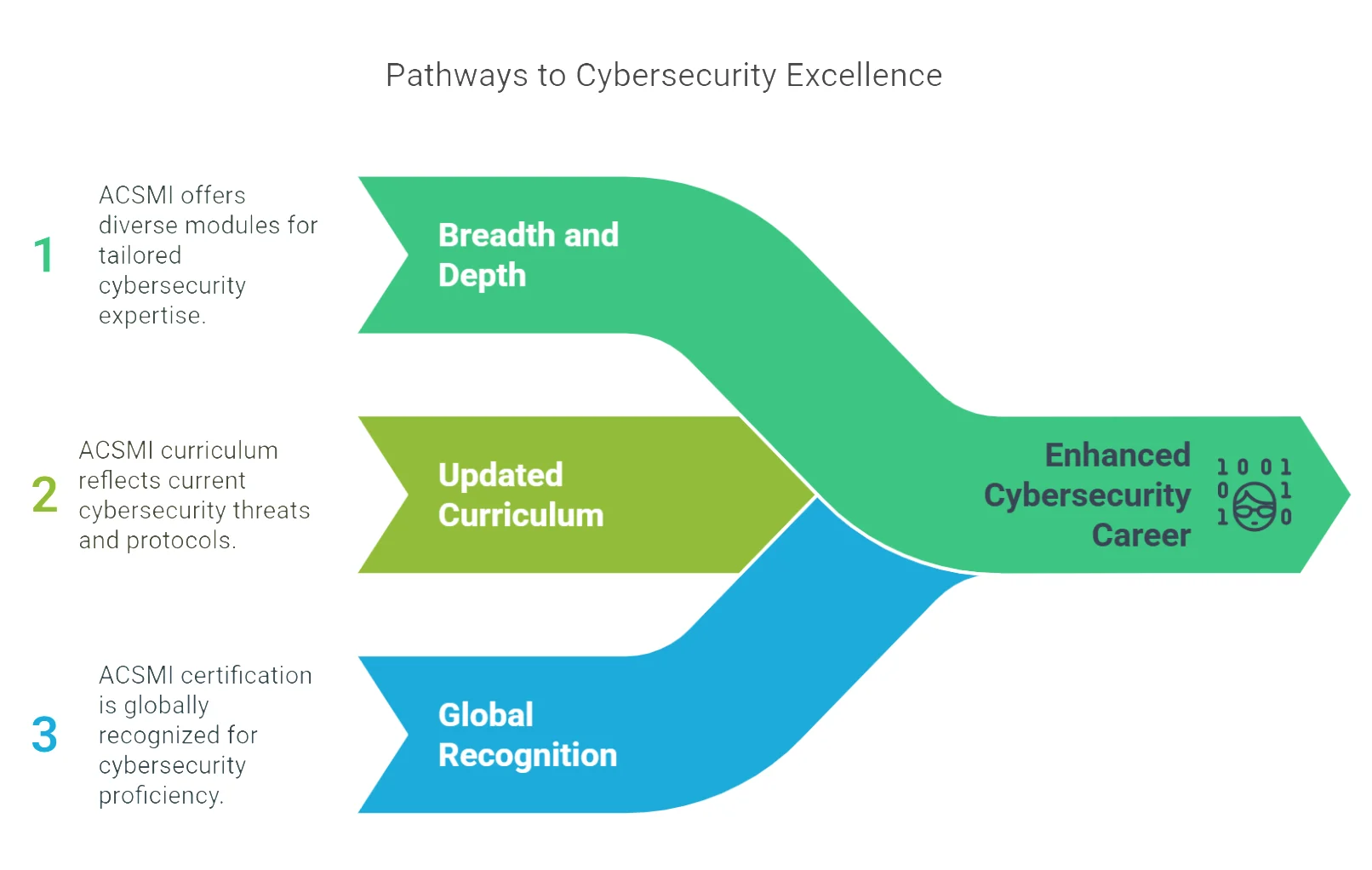Table of Contents
- Why Get Cybersecurity Certification?
- Top Certifications to Start Your Cybersecurity Career
- What Are the Steps to Get Cybersecurity Certification?
- Benefits of Pairing ACSMI Certification with Your Cybersecurity Goals
- Informative Table – Certifications Comparison
- FAQs About How to Get Cybersecurity Certification
- 1. What Is the Best Certification to Start With?
- 2. How Long Does It Take to Get Certified?
- 3. Are Cybersecurity Certifications Expensive?
- 4. Can I Pursue More than One Certification?
- 5. Do Certifications Expire?
- 6. Can I Study Certs on My Own?
- 7. Are Online Cybersecurity Certifications Legitimate?
- 8. How Much Can I Earn After Achieving a Cybersecurity Certification?
- Final Thoughts
The importance of cybersecurity has skyrocketed as more organizations and individuals rely on digital infrastructures. As Security Management Cyber Threats continue to evolve, cybersecurity professionals are in high demand to safeguard sensitive data, counter advanced cyberattacks, and secure networks and systems. Obtaining a cybersecurity certification is one of the best ways to prove your skills and stand out in this competitive field. If you’re wondering how to get cybersecurity certification and advance in your career, this guide will help you navigate through the steps and key certifications.
Why Get Cybersecurity Certification?
Cybersecurity certification is more than just a credential; it’s a testament to your knowledge and expertise in securing digital environments. As cyberattacks become more sophisticated, certifications serve as proof that you possess the necessary skills to protect systems and data in various environments. Here’s why pursuing a cybersecurity certification should be a priority:

Industry Recognition
Cybersecurity certifications are widely recognized in the industry. They demonstrate your ability to protect sensitive data, prevent breaches, and ensure the continuity of critical systems. Having a recognized certification makes you more appealing to employers, showcasing your competence and commitment to the field.
Career Growth
Obtaining a cybersecurity certification can significantly boost your career trajectory. Certified professionals often have access to better job opportunities, higher-paying roles, and a clear path to career advancement. Roles such as Network Security Engineer, SOC Analyst, and Compliance Specialist often require certifications as a qualification for hiring or promotion.
Expand Your Skill Set
Cybersecurity certifications cover the latest threat vectors, attack methods, and mitigation strategies. They equip you with in-depth knowledge about security protocols, encryption techniques, vulnerability management, and much more. With a certification, you will stay updated on the latest cybersecurity trends and technological advancements.
Global Opportunities
Many cybersecurity certifications are recognized globally, providing professionals the flexibility to apply for jobs in top-rated organizations worldwide. A certification ensures that your expertise is universally understood, giving you access to international job markets and career opportunities.
Whether you’re just beginning or looking to enhance your skills, certifications offer a systematic way to acquire and validate your cybersecurity knowledge, increasing your employability and marketability in the industry.
Top Certifications to Start Your Cybersecurity Career
Choosing the right certification depends on your current level of experience and career aspirations. Whether you’re a beginner, an intermediate professional, or someone looking to specialize in a specific area, the following cybersecurity certifications provide excellent starting points:

1. CompTIA Security+
CompTIA Security+ is one of the most well-known entry-level certifications in cybersecurity. It provides a solid foundation in network security, risk management, cryptography, and more.
- Ideal for: Entry-level IT professionals
- Focus Areas: Network security, risk management, and cryptography
- Cost: Around $392
This certification serves as a great stepping stone into the world of cybersecurity, preparing professionals for a wide variety of IT security roles.
2. Certified Ethical Hacker (CEH)
The Certified Ethical Hacker (CEH) certification teaches professionals how to think and act like hackers, allowing them to identify system vulnerabilities before cybercriminals can exploit them.
- Ideal for: Aspiring penetration testers and ethical hackers
- Focus Areas: Hacking methodologies, tools, and mitigation strategies
- Cost: Around $1,199
This certification is ideal for those interested in ethical hacking and penetration testing, offering a deeper understanding of the tools and techniques used by cybercriminals.
3. Cisco Certified CyberOps Associate
The Cisco Certified CyberOps Associate certification prepares professionals for roles in Security Operations Centers (SOCs). It offers knowledge on monitoring and investigating security incidents, incident response, and threat analysis.
- Ideal for: SOC analysts and cybersecurity teams
- Focus Areas: Threat analysis, SIEM tools, and incident response
- Cost: Approximately $300
This certification is ideal for those looking to build a career in the security operations domain, providing essential skills in defending against real-world security breaches.
4. ACSMI Certification
The ACSMI Certification offers over 400 modules covering everything from basic cybersecurity principles to advanced topics like threat intelligence and penetration testing.
- Ideal for: Professionals of all levels, from beginners to seasoned experts
- Focus Areas: Threat intelligence, advanced hacking, and infrastructure security
- Cost: Varies depending on selected modules
ACSMI certification is unique for its breadth and depth. With a modular learning structure, professionals can tailor their learning to fit their career goals, making it ideal for those looking to specialize or broaden their cybersecurity expertise.
5. GIAC Security Essentials Certification (GSEC)
The GIAC Security Essentials Certification (GSEC) bridges the gap between foundational and intermediate cybersecurity knowledge. It’s suitable for IT professionals looking to enhance their security skills and move towards higher-level roles.
- Ideal for: Systems administrators, IT professionals
- Focus Areas: Security concepts, active defense, network protocols
- Cost: Around $2,000 (including course materials)
This certification provides a strong foundation in cybersecurity concepts, making it a perfect choice for individuals looking to transition into security roles.
6. Certified Information Systems Security Professional (CISSP)
The CISSP certification is a globally recognized gold-standard credential for professionals aiming for leadership or specialized technical roles within cybersecurity.
- Ideal for: Experienced security practitioners and IT team leads
- Focus Areas: Risk management, security architecture, governance
- Cost: Around $749 for the exam (excluding training costs)
CISSP is highly respected in the industry and is ideal for those aiming for senior-level roles like Chief Information Security Officer (CISO) or Security Architect.
What Are the Steps to Get Cybersecurity Certification?
To get cybersecurity certification, you need to follow a clear and structured approach. Security Technology Key Trends play a vital role in shaping the certification landscape. Here are the key steps:
1. Identify Your Career Goals
The first step is to determine your career aspirations. Whether you’re interested in becoming a penetration tester, a network security expert, or a compliance specialist, knowing your goal helps you select the right certification.
2. Choose the Right Certification
Select a certification that aligns with your career path. If you’re new to cybersecurity, certifications like CompTIA Security+ are excellent entry points. If you’re looking for specialization, consider certifications like Certified Ethical Hacker (CEH) or CISSP for higher expertise.
3. Prepare Strategically
Once you’ve chosen your certification, plan your preparation. Enroll in official training programs or use self-study materials like online tutorials, books, and practice labs. Consistency is key to mastering the material and passing the exam.
4. Take Practice Exams
Most certifications offer practice exams or mock tests that simulate the actual exam format. These help familiarize you with the structure, difficulty, and types of questions you will face, increasing your chances of success.
5. Pass the Exam and Get Certified
After sufficient preparation, take the exam and earn your certification. Many certifications offer electronic badges as proof of achievement, which you can display on your LinkedIn profile, resume, or website.
Benefits of Pairing ACSMI Certification with Your Cybersecurity Goals
While individual certifications help build specialized skills, combining them with a comprehensive program like the ACSMI Certification can provide even greater career advantages. Here’s how ACSMI enhances your cybersecurity journey:

Breadth and Depth
ACSMI’s certification includes over 400 modules, giving you the flexibility to tailor your learning. Whether you’re interested in network security, ethical hacking, or cloud security, ACSMI offers modules that allow you to deepen your knowledge and broaden your expertise.
Updated Curriculum
ACSMI keeps pace with the ever-evolving cybersecurity landscape, offering materials that reflect emerging threats, new mitigation techniques, and the latest security protocols. This ensures you are always prepared for current challenges.
Global Recognition
ACSMI certification is globally recognized, making it a valuable asset no matter where you are in the world. Whether you’re working in the U.S., Europe, or Asia, an ACSMI certification signals your proficiency and dedication to the cybersecurity field.
Comparing Certifications: Key Points to Consider
When choosing a cybersecurity certification, consider factors such as the focus area, cost, time commitment, and career goals. For example, if you’re aiming for a leadership position, CISSP is ideal. If you’re starting your career, CompTIA Security+ or Certified Ethical Hacker (CEH) may be the best place to begin. Combining foundational certifications with advanced programs like ACSMI will give you the depth and versatility needed to succeed in the dynamic field of cybersecurity.
Final Thoughts
Obtaining a cybersecurity certification is a critical step in securing a rewarding career in the rapidly growing field of cybersecurity. Certifications validate your skills, enhance your employability, and open doors to lucrative job opportunities. By combining certifications with practical, hands-on training, such as that provided by ACSMI, you ensure that your career is built on a strong foundation of expertise and adaptability.
Start your journey today—take the first step toward achieving your cybersecurity certification and securing your place in the world’s most vital and fast-growing industry!
FAQs About How to Get Cybersecurity Certification
1. What Is the Best Certification to Start With?
For beginners, certifications like CompTIA Security+ or PCCSA from Palo Alto Networks are great entry points.
2. How Long Does It Take to Get Certified?
Entry-level certifications typically require 2-3 months of preparation, while advanced ones may take 6 months or more.
3. Are Cybersecurity Certifications Expensive?
Costs vary depending on the certification. Basic certifications like PCCSA can cost as low as $100, while more advanced certifications like CISSP may require an investment of up to $5,000 when including training fees.
4. Can I Pursue More than One Certification?
Yes, many professionals pursue multiple certifications. Combining foundational credentials with advanced ones, like CEH and ACSMI Certification, allows you to specialize and deepen your knowledge.
5. Do Certifications Expire?
Yes, most certifications are valid for 2-3 years, after which they require renewal. This typically involves retesting or earning Continuing Education Units (CEUs).
6. Can I Study Certs on My Own?
Yes, many certifications offer self-study resources such as video tutorials, simulators, and ebooks. Online learning platforms make it easier than ever to study for certifications at your own pace.
7. Are Online Cybersecurity Certifications Legitimate?
Absolutely! Many top organizations, including CompTIA and Cisco, offer legitimate online certifications. The key is to ensure the certification provider is well-recognized in the cybersecurity industry.
8. How Much Can I Earn After Achieving a Cybersecurity Certification?
Entry-level cybersecurity professionals can earn $60,000–$80,000 per year, while those with advanced certifications, such as CEH or ACSMI, can earn between $100,000–$150,000 annually.

Leave a Reply